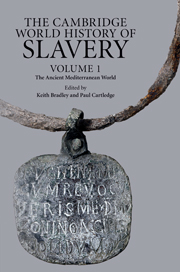Book contents
- Frontmatter
- Contents
- Series editors' introduction
- List of figures
- Acknowledgements
- Introduction
- 1 Slavery in the ancient Near East
- 2 Slaves in Greek literary culture
- 3 Classical Athens
- 4 The Helots: a contemporary review
- 5 Slavery and economy in the Greek world
- 6 The slave supply in classical Greece
- 7 Slavery and the Greek family
- 8 Resistance among chattel slaves in the classical Greek world
- 9 Archaeology and Greek slavery
- 10 Slavery in the Hellenistic world
- 11 Slavery and Roman literary culture
- 12 Slavery in the Roman Republic
- 13 Slavery Under the Principate
- 14 The Roman slave supply
- 15 Slave labour and Roman society
- 16 Slavery and the Roman family
- 17 Resisting slavery at Rome
- 18 Slavery and Roman material culture
- 19 Slavery and Roman law
- 20 Slavery and the Jews
- 21 Slavery and the rise of Christianity
- 22 Slavery in the late Roman world
- Bibliography
- General index
- Index of ancient passages cited
- Index of inscriptions and papyri
- Index of Jewish and Christian Literature Cited
5 - Slavery and economy in the Greek world
Published online by Cambridge University Press: 28 September 2011
- Frontmatter
- Contents
- Series editors' introduction
- List of figures
- Acknowledgements
- Introduction
- 1 Slavery in the ancient Near East
- 2 Slaves in Greek literary culture
- 3 Classical Athens
- 4 The Helots: a contemporary review
- 5 Slavery and economy in the Greek world
- 6 The slave supply in classical Greece
- 7 Slavery and the Greek family
- 8 Resistance among chattel slaves in the classical Greek world
- 9 Archaeology and Greek slavery
- 10 Slavery in the Hellenistic world
- 11 Slavery and Roman literary culture
- 12 Slavery in the Roman Republic
- 13 Slavery Under the Principate
- 14 The Roman slave supply
- 15 Slave labour and Roman society
- 16 Slavery and the Roman family
- 17 Resisting slavery at Rome
- 18 Slavery and Roman material culture
- 19 Slavery and Roman law
- 20 Slavery and the Jews
- 21 Slavery and the rise of Christianity
- 22 Slavery in the late Roman world
- Bibliography
- General index
- Index of ancient passages cited
- Index of inscriptions and papyri
- Index of Jewish and Christian Literature Cited
Summary
INTRODUCTION
This chapter assesses the location of slavery within the ancient Greek economy or, rather, economies. Its approach will be quite different from the little that the Greeks themselves, although surrounded by slaves, had to say about slavery as an institution. To most it seemed sufficient to know that slavery depended ultimately on war, but even philosophers never really cared to give a clear presentation of the way slavery functioned in the Greek world or of its contribution to production and to their civilisation at large. Since I shall claim that slavery was an important element in Greek material life, some explanation for the failure of Greek authors and thinkers to tackle the problem as I see it will have to be offered. It will, I hope, become clear that this negligence is perhaps more apparent than real, and that by expressing themselves in their own way, the Greeks sufficiently grasped the essence of slavery and the way it worked within their own society.
CHATTEL SLAVERY AND SERF-LIKE SLAVERY
To the Greeks the distinction between slavery and freedom was very meaningful, underlined not only by custom and convention but also by law. But learning from experience rather than contemplation, they felt the need to make a further distinction between two very broad categories of slaves. Although their vocabulary was blurred, they knew that the slaves of Athens were different as a type from the slaves of Sparta.
- Type
- Chapter
- Information
- The Cambridge World History of Slavery , pp. 91 - 111Publisher: Cambridge University PressPrint publication year: 2011
- 22
- Cited by

